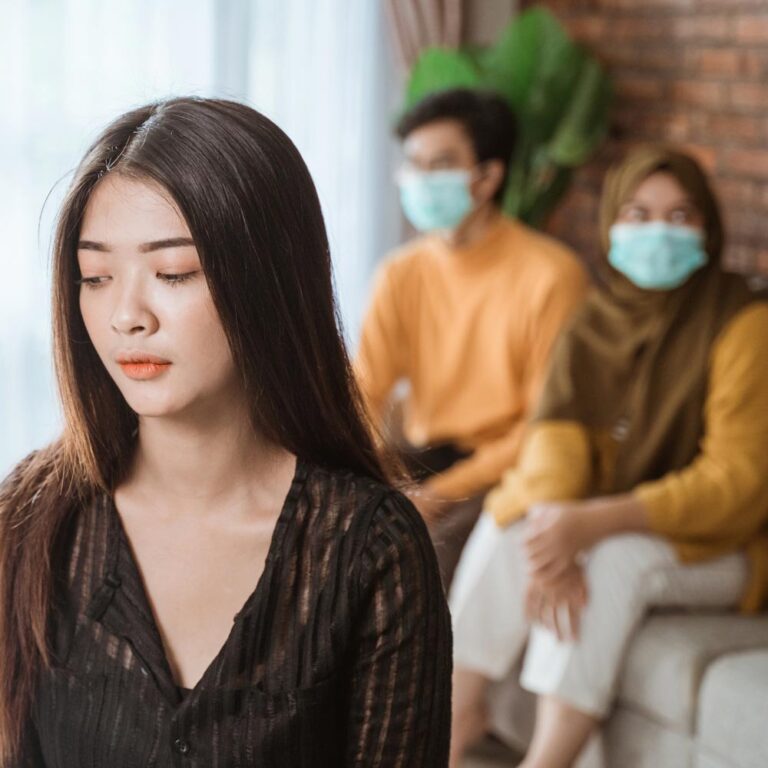The coronavirus (COVID-19) outbreak is stressful for many. As people try their best to follow CDC guidelines of “social distancing,” many may begin to experience depression and anxiety due to the lack of clarity regarding the situation and increased social isolation.
It is important to keep in mind that everyone reacts differently to stressful situations. Whether you feel anxious or numb, your emotions and reactions are completely valid. In addition, how you react may be impacted by a variety of factors.
Older adults or individuals with chronic health conditions may feel more anxious and vulnerable as they are more likely to suffer complications or death as a result of COVID-19. Individuals who work in healthcare may be worried about bringing the virus home to their families or even struggle with secondary traumatic stress reactions to the reality of caring for patients during this crisis. Other individuals may be faced with losing their jobs or risking their health and the health of their families by working and interacting with others who may be sick.
Individuals with mental health diagnoses like anxiety, depression or PTSD may experience an increase in symptoms. Even those who have never struggled with a clinical mental health issue may experience symptoms of acute stress, anxiety, and depression.
Know what is IN your control
With so much outside of our control, it is important to acknowledge what is in your control (your actions) and to try to let go of what you cannot control (other people, how long this will last). Things you can control right now include managing your exposure to other people who are not in your household. If you can stay home, stay home. If you must work, try to stay six feet away from others if possible. You can also practice mindful hygiene like washing your hands regularly and avoid touching your face. While you may not be able to control whether you become ill from COVID-19, you can decrease your risk of contracting the illness and spreading it to others who are vulnerable by practicing these behaviors regularly.
If you are already managing a mental health condition, it may be a good idea to connect with your therapist and see if telehealth or phone sessions are an option. Filling your prescriptions for the month may be helpful, as well as considering home delivery from your insurance provider or pharmacy.
Limit the time you spend watching the news or reading stories related to the virus. It is important to stay up to date with information about how to protect yourself, yet it is easy to become inundated with the amount of information on TV or social media. Remember to take breaks. A good rule of thumb is to restrict your exposure to COVID-19 related information by choosing only two sources to consult a day; a reputable source like CDC.gov might be a helpful place to start.
Stay Connected with others
Text, call, e-mail, and even video chat with your friends, family, and neighbors. Love Trivia Night? Why not try a virtual Trivia Night? Consider helping in small ways, like donating to a local food bank or donating blood to the Red Cross. Giving is a great way to help us feel like we’re part of the solution and connected to our community. Remember, social distancing is really means physical distancing. While we must be physically distant from one another, we want to be sure to stay connected to those relationships that mean the most to us during the pandemic. Our social connections are an important part of our immune system and a central part of being human.
Being completely without physical contact can be extremely difficult. Give yourself a butterfly hug or engage in self-soothing activities such as a warm bath. Items like a weighted blanket can also be helpful because it simulates the warmth and gentle pressure of being held.
Keep a Routine
Try to keep a routine and structure in your day as much as possible. If you’re working from home, it’s easy to sleep in or lounge in your jammies all day. While it can be healthy every once and awhile, not having a regular sleep routine can take a toll on our physical and mental health. Additionally, getting ready tends to set our intention for the day. Routine also includes hygiene.
Some healthy escapism can be a great way to get space from emotional pain or stress. This includes binging a show on Netflix or exploring a virtual open world in a video game. Other ideas might be adult coloring books, an art project, crossword puzzles, or reading a book.
Practice meditation
This is an excellent way to take a break from worrying about the unknowns and just be present. Focus on your breath. Repeat a mantra like, “Be calm.” You can also find lots of guided visualizations for free on YouTube. Additionally, there are great apps to help like Headspace, Calm, Aura, and Insight Timer.
Ground yourself in your five senses. Take a moment each day to truly observe what you see, smell, hear, touch, and taste. Have gratitude for the small joys in daily life like the scent of your favorite coffee or the sound of birds singing in the morning. Recognize these positive moments exist even within a global crisis. You can even take this a step further by participating in gratitude journaling by recording three positive things for which you are grateful each day. These needn’t be major items. Many times, the things I’m most grateful for are seemingly inconsequential— like my normally reserved cat being extra cuddly.
If you’re struggling with practical issues like paying bills or securing enough to eat, don’t forget about local resources. There are food banks, community centers, and crisis organizations that are willing and able to help. Many community schools and local restaurants provide free meals to students either by pick up or delivery.
Most importantly, remind yourself that, although we don’t know how long some of the changes in our lives will last due to this pandemic, they are temporary. Make plans for all the things you’d like to do once our lives return to normal. What restaurant would you like to eat at first? Which friend or loved one are you the most excited to see in person? Keep a list of these goals to remember what is waiting for you on the other side of quarantine.
Additionally, if you are interested in our self-guided courses, visit selfhelp.strengthenu.com.
Sources
https://www.cdc.gov/coronavirus/2019-ncov/prepare/managing-stress-anxiety.html




